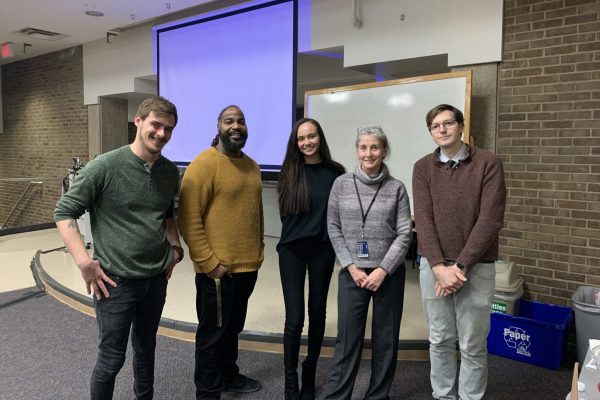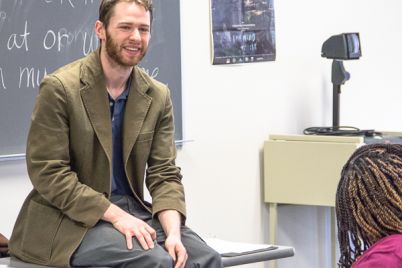
From left, David Seaman, president of the WCC Collegiate Recovery Program, Caleb Boswell, a student advisor and co-facilitator of the program, Taylor Turla, a WCC student in the program, Teresa Herzog, program coordinator, and Jeremy Walter, a student in the program. Lilly Kujawski | Washtenaw Voice
By Lilly Kujawski
Editor
Navigating college life can be challenging enough as it is, but for a student in recovery from an addiction, a college campus can be a downright hostile environment. This is according to members of WCC’s Collegiate Recovery Program, a peer-driven addiction support initiative with national chapters.
Collegiate Recovery Programs, or CRPs, are meant to encourage sobriety and create a community for students in recovery to connect with each other.
“Getting strength from one another is huge,” said Teresa Herzog, the program’s coordinator at WCC. She said the group facilitates peer-to-peer accountability, which helps students maintain sobriety.
One of the biggest barriers for students in recovery is the stigma surrounding addiction, according to David Seaman, 27, president of WCC’s CRP. To help combat this stigma, some of the students in the program held an educational discussion and presentation about addiction, recovery and their personal experiences.
Drug and alcohol addictions are more common that one might expect, according to Taylor Turla, 22, another student in the group.
According to a Washtenaw County Health Department Health Improvement Plan survey conducted in 2015, 15.6% of young adults ages 18-24 reported misuse of drugs or substances in the past year.
Much of Turla’s personal struggle with addiction stemmed from feeling like an outsider around her peers when she was growing up.
“I always felt like there was a glass wall between me and everybody else,” Turla said. “I felt like no one understood me.
“What drugs and alcohol did for me was take away that glass wall,” she added. “Drugs and alcohol worked as a solution until they didn’t.”
Seaman and Turla shared clips from Ted Talk videos about addiction at the event.
In a Ted X video titled “Lessons from the Mental Hospital,” speaker Glennon Doyle Melton shared similar feelings of loneliness and isolation that Turla did, particularly when she was in middle and high school.
Melton, an activist and author of the book “Carry On, Warrior,” said that oftentimes, people with addictions are thought of as insensitive or liars, but they don’t start out that way.
“The thing is, people are truth-tellers; we are born to make our unknown known. We will find somewhere to do it,” she said. “Because we don’t feel safe telling that truth in the real world, we make our own little world, and that’s addiction.”
In a Ted Talk titled “Everything You Think You Know About Addiction is Wrong,” Hari Johann said that treatment services don’t always address the real issues of addiction.
Johann, who is the author of the book “Chasing The Scream: The First and Last Days of the War on Drugs,” said that when someone with a drug or alcohol addiction is met with punishment, shame and criminalization, it actually worsens their addiction.
The best approach to treating addiction comes from offering connection and support, he said.
“The opposite of addiction is not sobriety; the opposite of addiction is connection,” Johann said in his Ted Talk.
“For 100 years now, we’ve been singing war songs about addicts. I think all along we should have been singing love songs to them,” Johann said.
The way you can help someone in your life who has an addiction is to “be compassionate” with them, said Seaman, who plans to transfer to U-M and study linguistics and law.
Turla has been sober since April 2017, but before she got to that point, she spent some time in jail. During that time, she bonded with the woman she was sharing a cell with. The woman’s kindness to her “re-sparked” in Turla a sense of belonging and human connection that she had lacked for a long time.
Turla, who plans to transfer to U-M and study neuroscience, said she finds a similar sense of belonging in the CRP group at WCC. She said her peers in the program understand her, and she can relate with them on “another level.”
Having friends and a feeling of hope is important to recovery, especially in the first year of sobriety, Turla said.
Unlike Alcoholics Anonymous, CRPs are not a 12-step program, but rather a support system that aims to reaffirm sobriety and create a social connection for students in recovery. CRPs also differ from other programs because they give students a place to relate with each other about experiences that are unique to being in recovery on a college campus.
Connecting with peers who are the same age can help students in recovery see that sobriety is “not only possible, but preferable,” said Seaman, who will be sober for three years next month.
For WCC students looking to get sober, getting in touch with the CRP group can help, Seaman said. He said the first step to recovery is to admit there’s a problem.
“I know it can be really overwhelming to ask for help and make that first step,” Turla added, but she said asking for help is key to recovery.
WCC’s Collegiate Recovery Program meets on Wednesdays from noon to 2 p.m. in LA 270.


